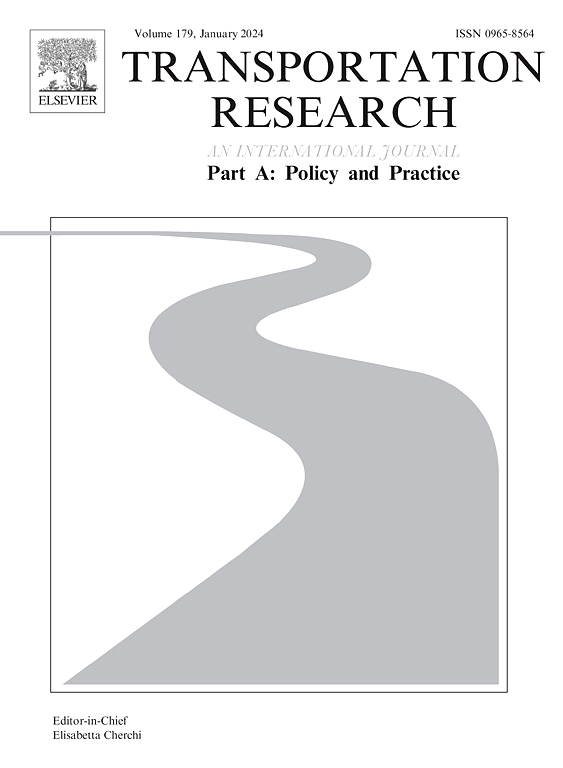Pro-poor transport subsidies: More user welfare and faster travel
IF 6.3
1区 工程技术
Q1 ECONOMICS
Transportation Research Part A-Policy and Practice
Pub Date : 2025-03-24
DOI:10.1016/j.tra.2025.104454
引用次数: 0
Abstract
A previous study has shown limited success of traditional fare discount subsidies in promoting public transport usage among low-income populations in Bogotá, Colombia. This paper evaluates the differential impacts of a novel demand-side subsidy, in the form of public transport vouchers, on user welfare and travel behavior. The study employs a large-scale randomized controlled trial involving 1607 frequent users of Bogotá’s Integrated Public Transport System, half of whom received monthly travel vouchers on their personalized travel cards. The other half acted as a control group. A discrete choice random utility model is utilized to analyze weekly travel patterns and estimate changes in welfare in terms of consumer surplus by gender and travel purpose, based on a panel database that has information on multiple travel choices over 6 months. The results indicate a significant increase in the utility of the BRT and regular bus services for voucher recipients, leading to increased BRT usage, decreased regular bus usage, and travel time savings. The study also finds that travel vouchers notably enhance user welfare, especially for female participants and non-work-related trips, suggesting these trip purposes generate greater user benefits. The findings highlight the potential of voucher-based subsidies to induce behavioral changes and improve welfare, particularly for groups that typically depend more on public transport services.
求助全文
约1分钟内获得全文
求助全文
来源期刊
CiteScore
13.20
自引率
7.80%
发文量
257
审稿时长
9.8 months
期刊介绍:
Transportation Research: Part A contains papers of general interest in all passenger and freight transportation modes: policy analysis, formulation and evaluation; planning; interaction with the political, socioeconomic and physical environment; design, management and evaluation of transportation systems. Topics are approached from any discipline or perspective: economics, engineering, sociology, psychology, etc. Case studies, survey and expository papers are included, as are articles which contribute to unification of the field, or to an understanding of the comparative aspects of different systems. Papers which assess the scope for technological innovation within a social or political framework are also published. The journal is international, and places equal emphasis on the problems of industrialized and non-industrialized regions.
Part A''s aims and scope are complementary to Transportation Research Part B: Methodological, Part C: Emerging Technologies and Part D: Transport and Environment. Part E: Logistics and Transportation Review. Part F: Traffic Psychology and Behaviour. The complete set forms the most cohesive and comprehensive reference of current research in transportation science.

 求助内容:
求助内容: 应助结果提醒方式:
应助结果提醒方式:


